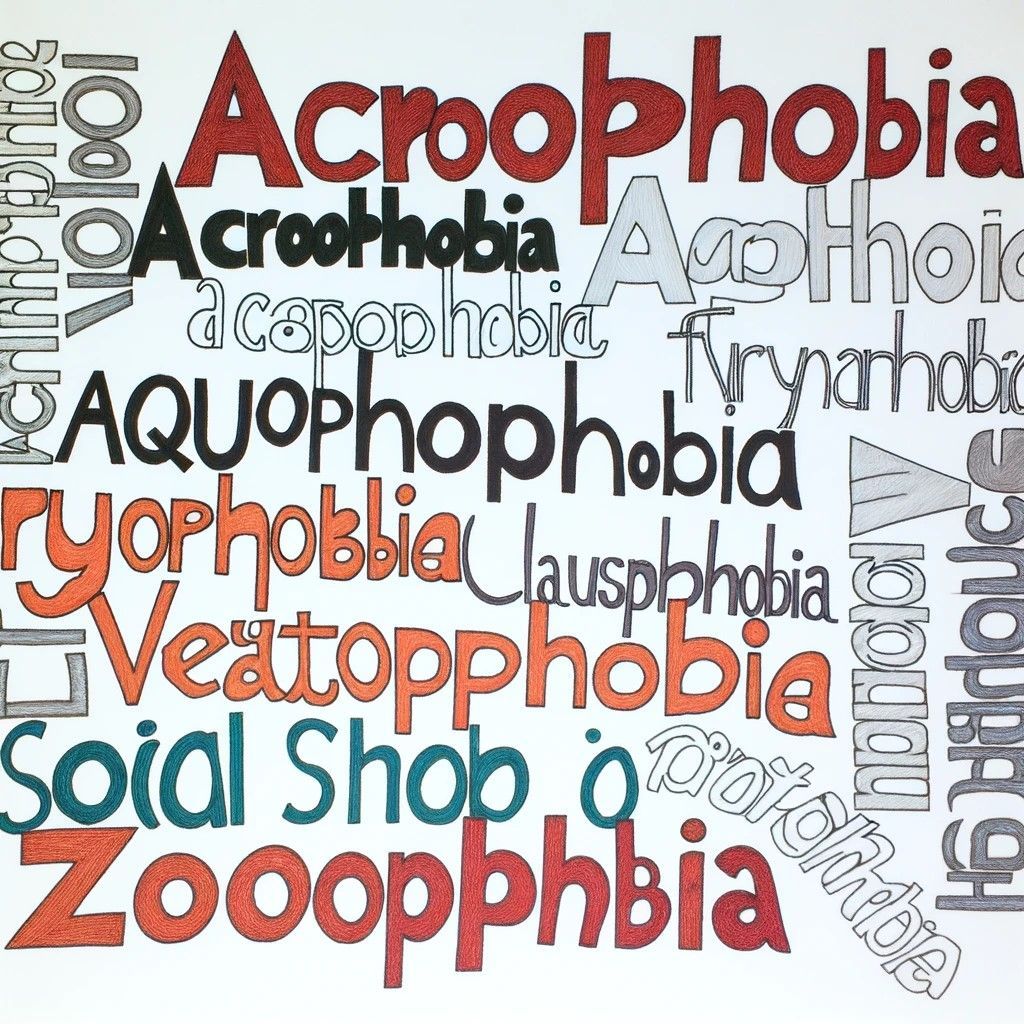Hypnosis for Phobias
Phobias
Hypnotherapy can be effective in treating various phobias such as Aviophobia, Acrophobia, Arachnophobia, Ophidiophobia, Glossophobia, Aquaphobia, Trypanophobia, Nyctophobia, Vehophobia, Claustrophobia, and Thanatophobia amongst others.
- Fear of Flying (Aviophobia): A common fear that can limit travel opportunities and cause significant anxiety.
- Fear of Heights (Acrophobia): This fear can make activities like climbing ladders or flying in an airplane uncomfortable.
- Fear of Spiders (Arachnophobia): Even though most spiders are harmless, this fear can cause a lot of distress.
- Fear of Snakes (Ophidiophobia): A common fear, even in areas where snakes are not a common threat.
- Fear of Public Speaking (Glossophobia): A widespread fear that can impact professional and personal life.
- Fear of Water (Aquaphobia): Hypnotherapy can help individuals feel more relaxed and comfortable around water, addressing the root causes of their fear.
- Fear of Needles (Trypanophobia): This fear can make medical procedures and vaccinations particularly challenging.
- Fear of Darkness (Nyctophobia): Often seen in children, but can persist into adulthood.
- Fear of Driving (Vehophobia): Hypnotherapy can help individuals overcome anxiety related to driving, helping them feel more confident and in control behind the wheel.
- Fear of Confined Spaces (Claustrophobia): This can make activities like riding in elevators or being in crowded places very difficult.
- Fear of Death (Thanatophobia): A fear that can lead to excessive worry about one's own mortality or the death of loved ones.
- Fear of Social Situations (Social Anxiety Disorder): This fear can make social interactions, including meeting new people or speaking in public, very challenging.
Why Choose Hypnosis to Resolve These Fears?
Hypnosis is a non-invasive, drug-free approach to addressing phobias. Many individuals experience significant improvement in their phobias after just a few sessions. Hypnotherapy can help uncover and address the underlying psychological factors contributing to the phobia. It can help individuals feel more in control of their thoughts and emotions, empowering them to manage their fears. The deep relaxation induced by hypnotherapy can reduce overall stress and anxiety levels, which can help alleviate phobic reactions. This type of therapy can be tailored to the specific needs and experiences of the individual, making it a personalized approach to overcoming phobias. It's important for individuals considering hypnotherapy for phobias to work with a qualified and experienced hypnotherapist, keeping in mind that additional theraputic approaches may be effective such as cognitive-behavioral therapy (CBT) for the best results.
How can these Phobias affect People on a Daily Basis?
Fears and phobias can have a significant impact on a person's daily life, affecting various aspects of their routine and well-being. Some people may engage in avoidance behavior, steering clear of situations or objects that trigger their fear, which can significantly limit their activities and experiences. Phobias can also interfere with routine activities; someone with a fear of driving might struggle to commute to work or run errands.
Social isolation is another consequence, particularly for those with social phobia, leading to avoiding going to get-togethers and impacting personal and professional relationships. The constant worry and anxiety associated with these fears can result in significant emotional distress. In many situations this may lead to feelings of frustration, embarrassment, or helplessness. Physical symptoms such as sweating, trembling, and rapid heartbeat can manifest, and in severe cases, panic attacks may occur. Chronic fear and anxiety can contribute to the development of other mental health issues, such as depression or generalized anxiety disorder.
Overall, fears and phobias can significantly reduce a person's quality of life, limiting their ability to enjoy activities, pursue goals, and feel a sense of well-being. Addressing these fears through therapeutic approaches can help individuals regain control over their lives and reduce the impact of these fears on their daily functioning.
How Everleigh Hypnosis Can Help You with Phobias
Hypnosis can be an effective tool in resolving fears and phobias by targeting the subconscious mind where many of these fears are rooted. During a hypnotherapy session, a trained hypnotherapist will guide the individual into a deeply relaxed state, which increases their receptiveness to positive suggestions and therapeutic interventions. In this state, the hypnotherapist can help the individual identify and address the underlying causes of their fear or phobia.
By using techniques such as visualization, the individual can be guided to imagine themselves facing the feared object or situation with confidence and calmness, thereby gradually reducing the fear response. Hypnosis can also help reframe negative thought patterns associated with the phobia, replacing them with more positive and empowering beliefs. Additionally, hypnosis can teach individuals relaxation techniques that they can use to manage anxiety when confronted with their fear in real life. Overall, hypnotherapy offers a holistic approach to overcoming fears and phobias, helping individuals to regain control over their emotions and reactions, and improving their quality of life.


